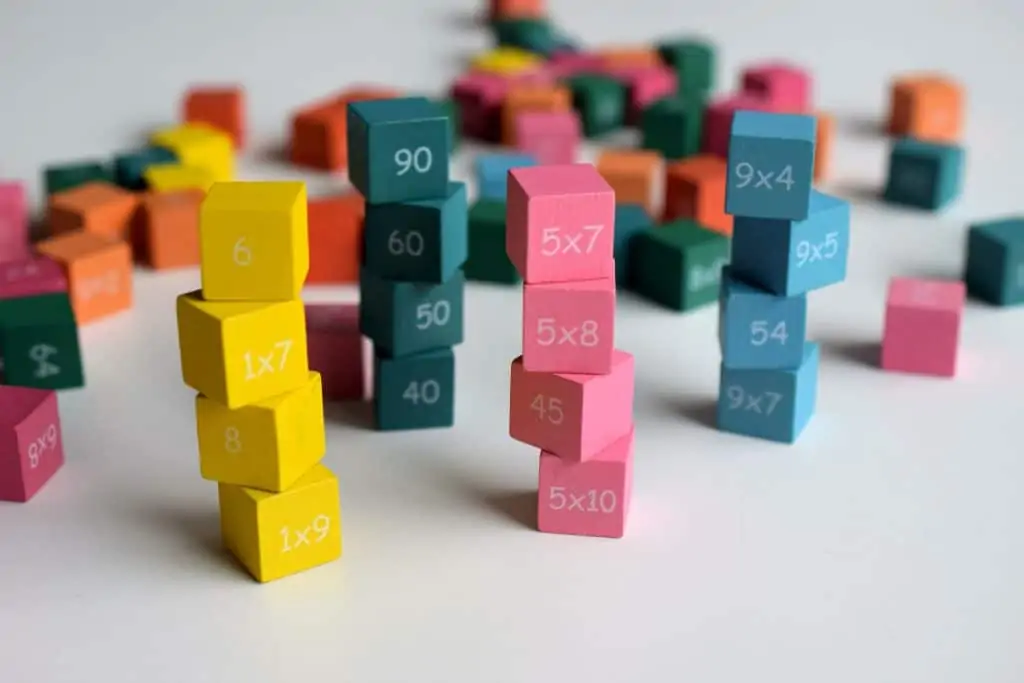Math is an essential part of your everyday life. Yet, it can be a very challenging subject in school and not easy to learn. If you’re having a hard time with math, then you’re probably worried about keeping up with your good grades. We are here to help!
This article is guide on how to be good at math! We are going to provide you with some tips for improving your math skills and improving on math basics. By the end of this article, you should know how to get your math grade up fast with key study habits.
First Things First: Can You Become Good at Math Overnight?
Wouldn’t it be great if you could just become good at math overnight?
Wouldn’t it be even better if you adopted practices that focused on improving your math skills? Doing this would help you understand how to approach new math topics as you continue to progress in your math classes. Knowing how to learn about math is the first step to actually getting math!
Remember, math is not about answers; it’s about processes.
While we don’t have the strategies to magically make you a math genius overnight; we do have other key tips and study habits that will help you get your math grades up fast.
How to Get Good Grades on Your Math Homework
If you’re reading this, you probably value your school performance and want nothing but good grades on all your homework. But, you might be dealing with some difficulty keeping up with algebra, geometry, or calculus. That’s ok; these are very unique math topics that require a particular learning approach that you may not be using.
We want to share some tips on how to get grades on your math homework; but we want you to apply these consistently throughout the school year. Please don’t expect results if you’re not willing to put in the time to practice.
Attend your math classes.
Make sure you attend all your math classes; missing one lecture can be difficult to catch up with, especially if you’re already having a hard time understanding the material. Going to class will give you the opportunity to have math concepts modelled for you by the instructor; so, pay very close attention to your instructor.
Math classes typically teach a new concept every class. So, if you miss one class, you may have missed an important foundational concept that leads up to the next class.
If you absolutely need to miss a class, make sure you contact the instructor or classmate who was present to share their notes. It might also be a good idea to ask about any make-up assignments.
Take detailed notes.
Now that you plan on attending every class to the extent possible, you should also take very detailed notes while you’re there. Write down key words, concepts, and any steps the instructor has written out on the board. Make sure your notes are legible so that you can refer to them later.
If there’s something you’re not sure about, draw a star next to it, and ask your instructor about it at the end of class.
Sometimes, it may be difficult to write down everything the instructor is saying or keep up with the lecture when you’re writing. Consider using your phone’s voice recorder or bringing in a tape recorder to class. This will give you the opportunity to make your notes even more detailed and give you a chance to replay the lecture in case something wasn’t clear in your notes.
Complete all your assignments.
Homework is never an option! We strongly encourage you to complete all and any set of questions you get to practice. Make sure you have a solid homework schedule to write out problems and review material.
Practice is essential to getting good grades on your math homework.
Find a friend.
Look at the person to your left in your math class. Make friends with them right away. A study buddy will help you by sharing their notes when you are absent.
Having a study buddy is also great for teamwork assignments, where your teacher will usually ask you to exchange your work with the person next to you. This person can tell you exactly where you went wrong and will be familiar with your work.
Overall, make sure to develop positive relationships with the students surrounding you in math class.
Use study groups.
You are likely not the only student in class who is concerned about doing well in math class. Ask other students in class if they would like to start a study group to review the lessons you learned that same day.
This could be a great way to learn from others’ understanding of the material, learn more about the math concepts by teaching someone else how to do it, and may even keep you motivated to study.
Some brief tips we’d strongly recommend for study groups:
- Keep your group small (1-3) to keep everyone focused.
- Choose students who are motivated to learn as much as you are.
- Choose students who you really think will help you work through the math material.
Ask for help early.
We don’t want you to ask for help at 6 in the morning; we want you to ask for help as soon as you realize you are not understanding the material. If you have gone over the problem numerous times, and the process still doesn’t make any sense to you; ask for help right away.
Math concepts tend to build on one another, so if you don’t get one concept, it will likely make the next one more challenging to grasp.
Asking for help early will be crucial for improving math basics.
Get to know your calculator.
Say hello to your little friend, the calculator! This handy device will save you a lot of time and energy to solve problems in class, if permissible. But, you need to first understand what the calculator is doing and how to use it for complex problems.
Practice problems with your calculator to become familiar with how it works and to what extent you can apply it in your math homework. Some calculators can help solve extremely complex math problems; you just need to know how to use it to your benefit!
Key Homework and Study Habits for Math Success
Now, how to get your math grade up fast?
Let’s talk about some key homework and study habits for improving your math grades. Habits are behaviors you should start including into your daily routine for math success. Always remember that consistency is key!
1. Engage and participate in class.
We talked about how important it is to attend your math class in the How to Get Good Grades on Your Math Homework section. Now, we want you to incorporate active learning processes while you’re there.
What exactly does it mean to engage and participate in class?
Raise your hand. Ask questions. Volunteer yourself to try out a problem on the board.
We know this can be nerve-wrecking, but this is an excellent opportunity to learn with your instructor. Do not concern yourself about making mistakes, you want to make mistakes in front of your instructor so that you can learn the proper way to work out a problem.
2. Write out sample problems.
It’s important to write out every sample problem your teacher provides in class. Teachers will usually write these out on the board for students to learn the math process visually.
When you get home from class that day, try to work out the same problem your teacher demonstrated. Don’t check your answers until you’ve solved the entire solution.
Did you get to the same answer?
This is a great study habit that will strengthen what you just learned that day and will also boost your confidence because you’re already well on your way to improving your math skills.
If you have worked out the problem repeatedly and still cannot get to the same solution, make sure to ask your teacher or tutor to explain it again. If possible, bring all the scrap paper that shows your steps to find the math error. You want to make sure you understand the example because the homework assignments and exams will build on this.
3. Create a list of key terms to review after class.
We’ve asked you to write out sample problems that are shared in class. Usually, these problems have a formula, theory, or other foundational concept that help explain the solution in theoretical terms.
Write these down to review later after class. These can be the definitions of certain aspects of the equation, formulas, or even theories. For instance, if your instructor wrote out a problem on a simple algebra equation, where
2x+30(10)=300.
First, you’d want to write down this exact formula. Likely, your instructor will write out that x is a variable and is the answer you need to solve for the problem. In your notes, you would write the term, “variable” to review later.
Your teacher might also explain that the number before the variable is termed a coefficient and that the numbers “2x” are considered terms. Now, your list should include the formula and the following key terms: variable, coefficient, terms. You would review all these after class to grasp their relevance to the equation.
4. Establish a time to do homework and study.
Reviewing new math concepts should be done on a daily basis. Since you are already creating a list of topics to review after class, you can start small and only focus on reviewing the lesson of the day. However, as the class progresses, we encourage you to review everything you’ve learned up to that point to make sure you have a firm understanding of all the math lessons.
Make sure you set aside enough time to do homework and to review materials. Some math problems can take a very long time to get through. We strongly encourage you to spend at least 3 hours on your math homework and reviewing materials to reinforce what you’ve learned.
Studying after class that same day is a great tactic because the content is still fresh in your mind, so if you review materials that early, you’ll be sure to know your material very well.
5. Read your math books.
Reading about math is not necessarily a lot of fun, but it can be most practical in understanding complex concepts and theories. We encourage you to read math books more than once. If possible, read them while you are completing your homework and reviewing your materials after class.
Do all the textbook questions and complete these more than once. The point here is to practice solving the problems, while also reinforcing what you’ve learned. This will help you assess the extent of your knowledge on a particular concept before moving onto the next lesson.
6. Use reference books.
We don’t want to encourage you to use more money to buy math textbooks, but we do think using reference books outside of class can be extremely useful.
Most times, the public library will give you access to a significant amount of reference books that you can use to build your knowledge on a math concept. There are also several online sources you can use on Google Books to read more about a specific math topic.
7. Do as many practice problems as possible.
Practice is key in improving your math skills. Complete all the practice problems assigned in class, in your textbooks, and in your homework. Try to find as many additional practice problems outside of your class to test your skills on different formats.
Make this an essential part of your homework and study habits. Many practice problems will actually appear on the exam, so you’re preparing yourself for exam questions, as well as strengthening your math skills.
There are plenty of online resources that will provide you with lessons, practice problems, and practice exams to test your skills and knowledge. Make sure to utilize these to your advantage.
8. Show step-by-step solutions on all assignments and practice problems.
You should always show your work on all your math problems. Doing this will help you learn from your mistakes; it will also help with the grading process. Sometimes, teachers make mistakes grading, so you can challenge your grade if your work is demonstrated on the exam or assignment.
Teachers may also consider giving you points for working out the steps to the problem exactly as expected without getting the right answer. Showing your work will show your teacher that you’ve spent time studying the material and doing the homework. Take advantage of these possible points!
9. Prepare yourself before the next class.
Review all the materials you’ve learned so far from the class, and do some practice exercises to make sure you’ve got the concept down. If you get them right away, great! If you have trouble getting to a solution, identify your error and go over that section one more time.
Take notes on anything that remains unclear so that you can ask next class. Chances are that the next lesson is building on this, so you want to make sure that you understand every lesson as much as possible.
Try to review the chapter that your teacher will be discussing the next class to get an idea on what to expect. Jot down terms that seem very new so that you know what to look for in the next lecture.
How to Learn from Your Math Errors
If you studied really hard for your math test, but didn’t get the grade you were expecting, we want you to consider learning from your math errors.
You’re probably thinking, how in the world would I learn from my math errors?
Follow these steps:
Review the errors on your exams or homework.
First, review the errors on your exams or homework very carefully. Hopefully, you have worked out the math problem with every step written out on paper. Did you find your error?
Work out the problem again.
Now, go back and fix the error. Work out the solution again until you’ve completed the problem on your own without referring to the answer.
Reflect on your errors.
It’s important to fix math errors and understand exactly why they were made. Take the time to explain why this was a mistake in getting to the solution and what you’ve done differently to correct this.
Sometimes, these errors are very small details that may have slipped your mind, but now that you’ve called attention to this, you’ll be more attentive next time. This will help avoid making the mistake again on your next exam.
Work on areas for improvement.
Learning from your math errors also gives you the chance to identify where you need more practice. For instance, maybe your multiplication isn’t as sharp as you thought, and you mistakenly thought that 6 multiplied by 3 was 21. You find that this is the only mistake you made in the problem.
In knowing this, you can start practicing more on your basic math skills in multiplication to give you a better foundational standing in algebra.
Ask for help.
If you’re still unsure as to why you were wrong on a math question, ask your teacher after class or consider getting a tutor.
Ask your instructors to write out their response to the question again. Compare their responses to yours to find the math errors.
How to Make the Most Out of Your Time in Math Class
Now, we’ve equipped you with strategies on how to succeed on your math homework and to improve your study habits, but how can you make the most out of the math class you are obligated to sit in for over an hour?
Think of math class as an additional resource for help and a potential contribution to helping you progress forward. You want to make use of all your resources that you have to give math your best efforts.
Our set of tips on how to make the most out of your math time in class prioritize the role of the teacher.
Get to know your teacher.
This is not as intimidating as it sounds, but we encourage you to talk to your teacher to get to know them and to give them a chance to get to know you. This will set the stage for ongoing conversations about any challenges or lack of clarity you’re experiencing with any math assignments.
In getting to know your teacher, you want to establish a good relationship. The first step in doing this would be to introduce yourself, let the teacher know that you’re excited about their class and are looking forward to learning new concepts. Keep it as simple as that.
The more involved teachers see you, the more they realize how much you care about the class.
Talk to your teacher after class.
If today’s lesson was particularly difficult, and you feel like you did not understand a single concept, take the time to talk to your teacher after class. Once class is done, walk up to your teacher’s desk and ask if they have time today or later in the week to discuss the lesson.
One important note: You should always be considerate of your instructor’s time and ask them when they would be available to meet. Do not just take up their time after class without asking them first. Usually, teachers will have after school hours or office hours available for students to ask additional questions.
Remember that you need to ask for help early. This will help keep you from falling behind in the lessons.
Ask other adults for help.
If you’re too scared to talk to your teacher about something you don’t understand, then ask a friend, a parent, a sibling! Use your lifelines! It’s important to ask for help if you are struggling in math.
If you feel even more confused after talking to your family, then muster up the courage and talk to your teacher. Teachers are there to help you succeed in class; it is their job to teach you.
Practice basic math skills.
Make sure you have a firm understanding on basic skills, including multiplication, addition, subtraction, and division. If you feel like you are struggling with basic math skills, then we encourage you to dedicate time studying and reviewing these with additional resources.
One easy tip is to create flashcards. Creating flashcards with quick problems will help you process responses faster. You should be able to know what 9X7 is within 5 seconds. This will also help you complete homework faster.
There are other, more engaging options to improving basic math skills, such as math games. Plenty of websites have these for students; here is a resource to start.
Since multiplication is the foundation for most math concepts, you’ll also get an opportunity to strengthen your ability to process new math concepts if you practice building basic skills.
The key is to practice as much as possible.
What if You Don’t Like Participating in Math Class?
Throughout this article, we’ve emphasized how important is to ask for help as soon as you are faced with a challenge in your math class. We think participating in class is the best time to ask questions because the teacher can respond to you right away, and you may even have questions that other students were too scared to ask.
However, we understand that sometimes, people are shy or reluctant to participate in math class. It can be an intimidating space, especially if you are feeling completely lost on what is being taught to you. We’re happy to inform you that there are other options!
If you don’t like participating in math class, there are several other options to ask questions or clarify a solution through educational websites, afterschool problems, tutoring services, or even through joining a club. It will be extremely important for you to find a space where you feel comfortable enough to practice solving math problems with ongoing feedback.
It will be extremely difficult if you expect to learn math on your own. It is a group effort; you need to learn from your peers, as well as discuss lectures, ideas, and homework.
Consider looking into your school’s math club. Math clubs are a great way to practice your basic math skills and put you in touch with other peers. It would be like taking a low-stress class with a small group of peers, rather than a teacher.
How to Use Your Math Textbook to Help You Learn
- Review the list of terms you’ve created from class. Use your index and glossary to jot down notes, especially if you’ve forgotten what they mean.
- Your math textbook will typically illustrate an example of a lesson. Write all the details down in your notes to walk through the example first-hand. Analyze it so that you can grasp the ideas and procedures behind the formula.
- Your math textbook will also have material explaining the exercises for each chapter. If you find yourself having trouble getting these, read the explanatory material in the book and go over your class notes.
- We also encourage you to make use of online resources, such as If you can’t do an exercise, reread the explanatory material in the book and/or go over your class notes.
- Always use the study guides and reviews at the end of each chapter!
How to Review for Math Tests or Exams
You should already be reviewing all your math material after every class. We encourage you to apply our tips in the Key Homework and Study Habits for Math Success section. Apply these same practices to review for math exams.
Here are some additional pro-tips on how to review for your math exam.
- Review all your homework and quizzes.
- Create flashcards using Quizlet.
- Study somewhere quiet and free of distractions.
- Take a practice test with a timer.
- Make a list of hard problems and easy problems to spend time reviewing the more difficult concepts.
- Do not cram the day before an exam. Make sure to study a week in advance.
How to Ace Your Math Tests
We encourage you to use all the strategies and tips shared in this article to help you ace that math test. One more strategy that we can offer is specific to your test-taking abilities.
Use effective test-taking strategies.
There are test-taking strategies that you can use to help you ace your math exams. Follow these approaches during your exam time to succeed.
- Stay aware of the time you have allotted for the exam.
- Prioritize questions; which ones are worth the most points? Work on those first.
- If you find yourself getting stuck with a problem, walk away from it. Move on to the next question and return to this one at the end.
- Write out all your problems, show your work. Remember that you can still get partial credit for showing your work because it demonstrates how much material you’ve reviewed.
- Once you are done with the exam, review all your work! Make sure you’ve completed every question because that gives you more of a chance of getting points.
Wrapping Things Up: How to Get Good Grades in Math
Math can be one of the most challenging subjects in school! However, we encourage you to use all our tips daily to strengthen your basic math skills on a daily basis. Always remember that math is more about the process rather than the right answer.
The most important thing to remember is to keep practicing your skills and understanding of the ongoing lessons as you progress in your math class. Always revisit concepts and exercises, no matter how much you think you know. You’ll be sure to get good grades in math and understand new concepts easier!
Did you enjoy this post? Then you’ll love our other high school study tips. Check them out below:
> Test Anxiety Symptoms: What to Look For?
> How to Solve Math Word Problems Effectively?
> The 7 Most Common Careless Mistakes on the SAT Math Test (And How to Prevent Them)





















